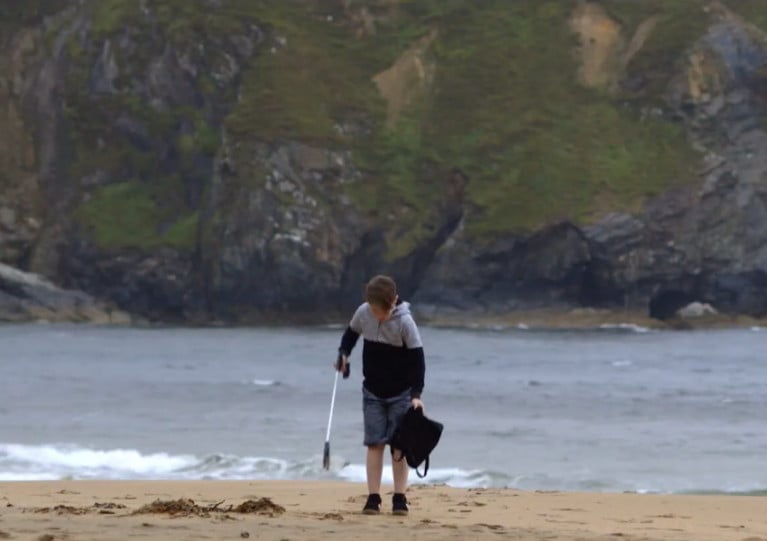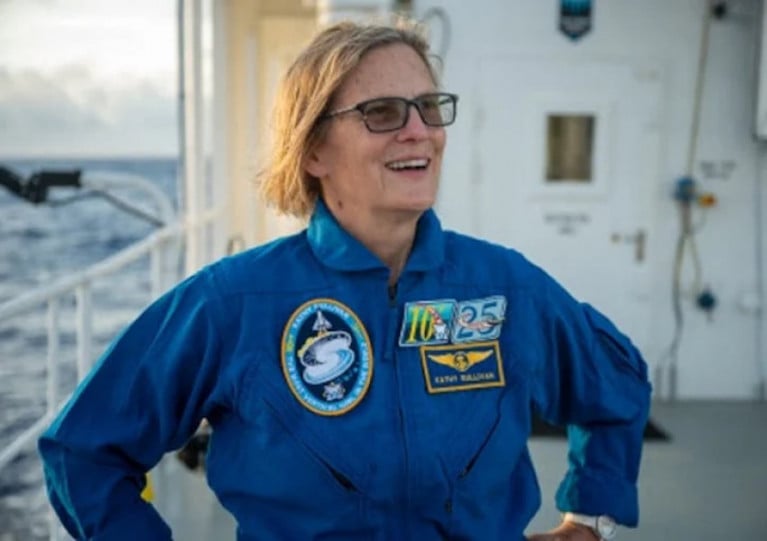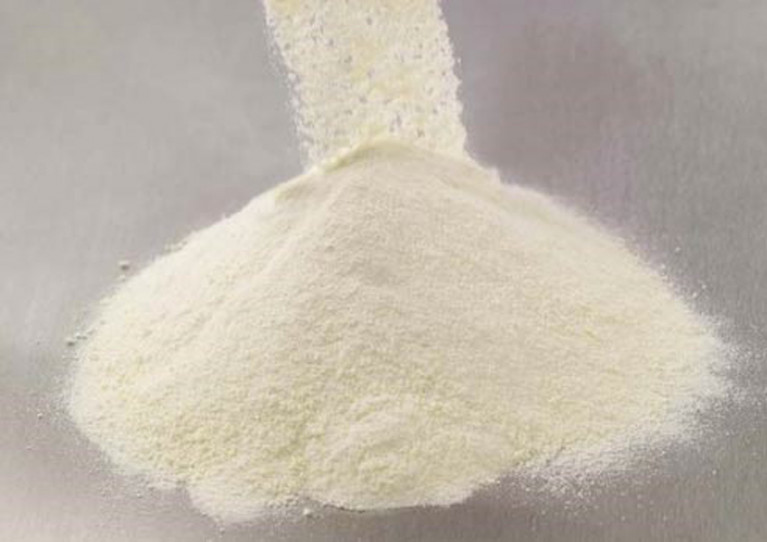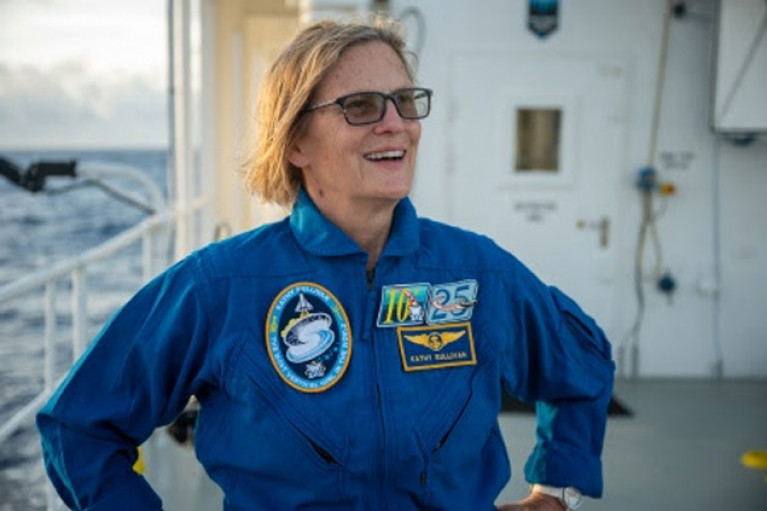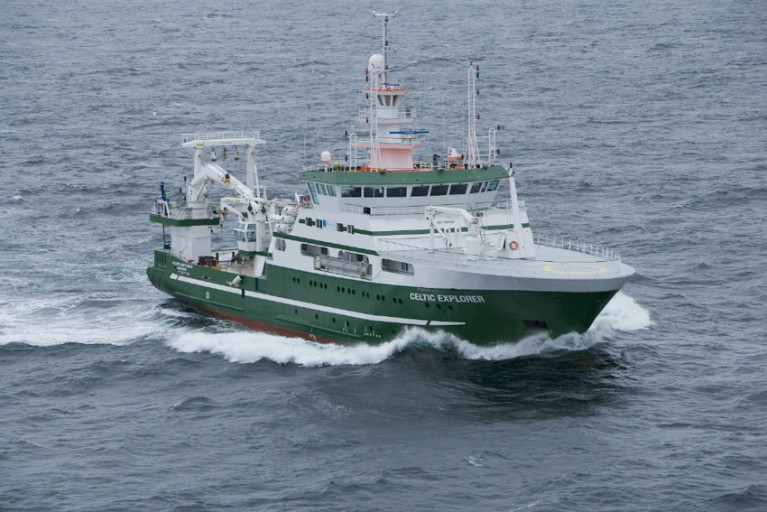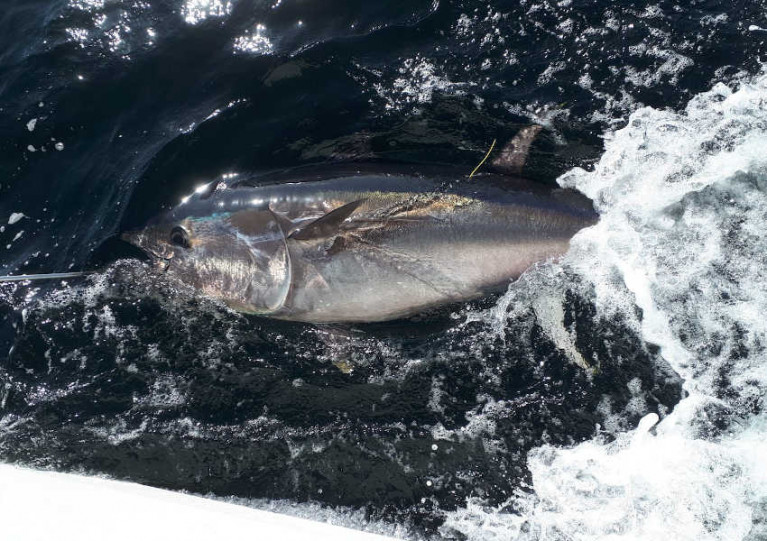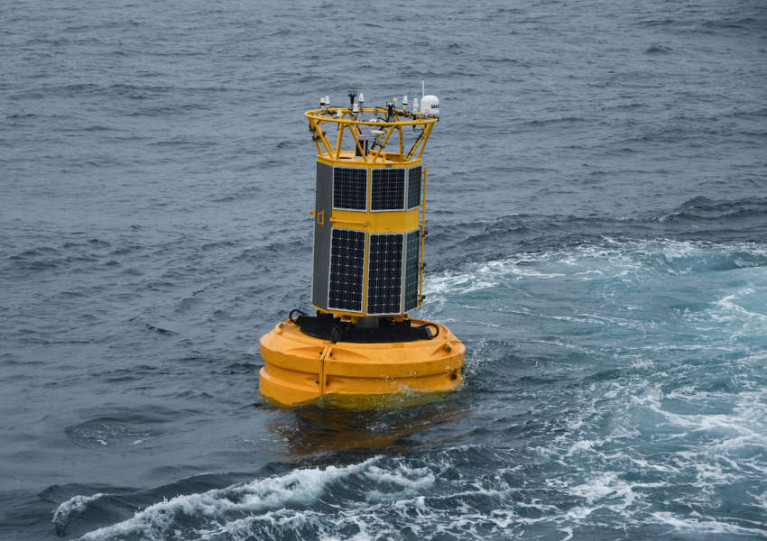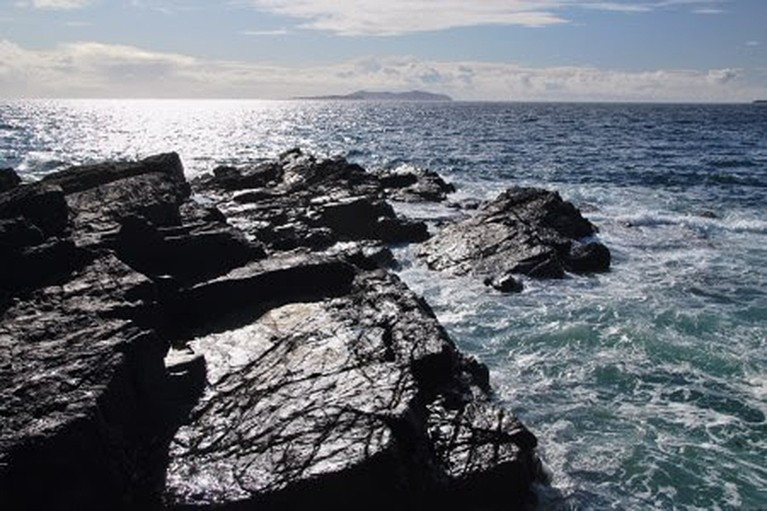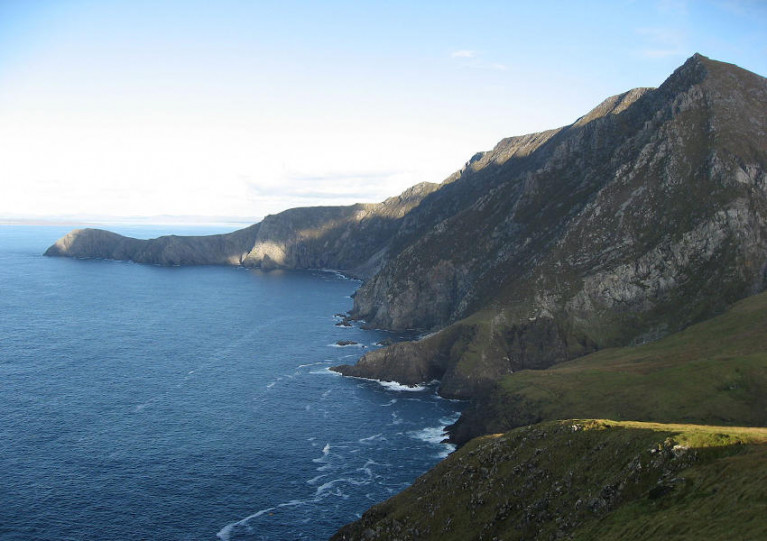Displaying items by tag: Marine Institute
A new short film comes with a message that we can all ‘sea’ the future of Ireland’s ocean wealth together.
The video was launched by the Marine Institute as part of the final week of its Oceans of Learning programme, which has been celebrating our connection to the seas with a new marine research topic each week over the last 10 weeks.
The final week, One Shared Ocean, One Shared Future, had focused on the importance of local, national and international collaboration to explore and understand our marine resource.
“Our ocean is our greatest national resource,” says Dr Paul Connolly, chief executive of the Marine Institute.
“As a nation, Ireland made a strategic choice to develop a greater appreciation of its maritime heritage and of the opportunities presented by its 880,000 sq km marine territory.
“The Marine Institute’s work in co-ordinating and promoting marine research is essential for achieving a sustainable ocean economy, protecting ecosystems and inspiring a shared understanding of the ocean.”
He adds: “Looking to the future, there’s enormous opportunity for Ireland and its people to be engaged in ocean innovation and research — and what could be described as the last great exploration campaign on Earth.”
The launch bookends the final Oceans of Learning theme with last week’s special interview with former astronaut and now marine researcher Kathy Sullivan — the first person to visit both deep space and the furthest depths of the ocean.
This week’s Oceans of Learning topic, the final one in the 10-week series from the Marine Institute, focuses on partnerships between marine science, industry and education and how these can help ensure a healthy and sustainable future for our ocean.
Collaboration is one of the core values of the Marine Institute’s work — from mapping our seabed to policy support and scientific advice for the maritime sector, seafood safety monitoring services and funding marine research projects.
“It is vital to have a culture of open communication and a collaborative mind set with government, industry and other organisations in Ireland, to keep a focus on knowledge gap areas and new research requirements that will allow us to sustainably use and protect our ocean resource,” said Dr Paul Connolly, chief executive of the Marine Institute.
“Working on the international stage is also very important and is key to develop research programmes that deepen our understanding of the ocean and predict how it may change and impact on our island nation."
One of the Marine Institute’s key activities over the next 10 years will be the Europe-wide Mission Ocean, which focuses on restoring the health of our oceans, seas, rivers and lakes.
The goal of Mission Ocean is that by 2030 we will be focused on cleaning marine and fresh waters, restoring degraded ecosystems and habitats, and decarbonising the blue economy in order to sustainably harness the essential ‘goods and services’ that our oceans, seas, rivers and lakes provide.
“The ocean is our greatest natural resource. It provides us with the oxygen we breathe, provides us with food, influences our weather and climate, contributes to our economy, sustains our coastal communities and promotes our overall wellbeing,” said Dr Connolly.
“Understanding our ocean and providing the scientific advice for its sustainable use are central to the Marine Institute’s work and are key to our future.”
The week kicks off this afternoon (Thursday 23 July) with an exclusive Irish interview with Kathy Sullivan, the first person to ever experience travelling to both deep space and the furthest depths of the ocean.
Sullivan said: “We live on a very dynamic planet and need rich, detailed information to understand it. Whether it is in deep outer space or the inner deep of the ocean, it is important to be curious and explore our complex planet.”
Marking the closing week of the Oceans of Learning series, Marine Minister Dara Calleary said: “As an island nation, Ireland has a special relationship with the seas and oceans. The future of Ireland’s seafood sector and coastal communities will depend on the sustainable management of this precious resource…
“The Government also recognises the enormous potential that the ocean has to offer in tackling climate change and the need for further scientific research to understand and develop this potential.”
Resources for this week’s Oceans of Learning theme, One Shared Ocean, One Shared Future, are available from the Marine Institute website.
Don’t Miss History-Making Kathy Sullivan Talk ‘Extraordinary Exploration’ From Space To Sea Floor In Exclusive Irish Interview
The first person to experience travel to both outer space and the deepest part of the sea will be the subject of an exclusive Irish interview with Pat Kenny tomorrow, Thursday 23 July.
As previously reported on Afloat.ie, oceanographer and former Nasa astronaut Kathy Sullivan already made history as the first woman spacewalker in 1984.
But she doubled that achievement last month when she became the first woman to reach Challenger Deep — the deepest-known part of the world’s oceans at 35,810 feet below the surface.
As opposite as these two missions may seem, however, they both come from Sullivan’s passion to understand the world around her as much as possible.
Sullivan — who was also interviewed by Lorna Siggins for the Sunday Times this past weekend — will talk making history, exploring the frontiers of our world and more with Pat Kenny tomorrow, Thursday 23 July, as part of the Marine Institute’s Oceans of Learnings series.
The interview will be streamed live on the Marine Institute’s channels on Facebook, Twitter and YouTube from 2pm Irish time (or 9am EST in the US).
A fisheries science partnership previously touted as a ‘game changer’ in the field of marine food is developing new health supplement based on fish protein from blue whiting.
Bio-Marine Ingredients Ireland (BII) is preparing to begin clinical trials of its soluble protein hydrolysate power, which it’s hoped could improve muscular health among the elderly.
“We are one of the first companies globally to take under-utilised raw fish materials and transform them into powders suited to applications for human nutrition,” said Dr Snehal Gite, senior research and development technologist.
“At BII, we are processing a low-value blue whiting fish into a high value nutritional ingredient which could offer enormous benefits for skeletal health in older people.
“The outcome of this research project could see BII enter a valuable global market, which will ultimately benefit Irish fishermen, industry and the associated supply chain.”
Research on this potentially health-boosting supplement is featured in this week’s Oceans of Learning series from the Marine Institute, which looks at the ocean and its connection to human health and wellbeing.
The work of the National Marine Biodiscovery Laboratory of Ireland (NMBLI) is also in focus, as a number of new natural products with potentially powerful properties have been found in Ireland’s waters in recent years.
“Our ocean could offer a treasure trove of cures,” said Joe Silke, director of marine environment food and safety Services at the Marine Institute.
“With so much of our marine habitats yet to be explored, and an ever-changing marine environment … Ireland’s ocean wealth is still to be uncovered.”
Videos, interactive activities and downloadable resources are available from the Our Ocean: Our Health and Wellbeing portal on the Marine Institute website.
Kathy Sullivan's Exploration From Space to the Sea Floor
The Most Vertical Girl in the World. The woman who's made history in sea and space; The astronaut, oceanographer, explorer, author and the first person to ever experience travelling to both deep space and the oceans deep.
Kathy Sullivan is already in the history books as the first American woman to walk in space in 1984, the 68-year-old found herself making history again just last month.
On June 6, the oceanographer and former NASA astronaut became the first woman to reach Challenger Deep, the deepest known location in the ocean.
The 35,810-foot dive, which was undertaken on the DSV Limiting Factor and co-piloted by Victor Vescovo, now makes Sullivan the first person to both walk-in space and descend to the deepest point in the ocean.
The two missions, total opposites in the minds of many, for Sullivan, come from her one simple desire: to understand the world around her as much as possible.
Join Kathy Sullivan in an exclusive Irish Interview with broadcaster Pat Kenny where she will share her remarkable history-making story, offering unique insights into her exploration at the extreme frontiers, recalling the experiences of walking in space and charting oceans.
You can tune into the Kathy Sullivan in Conversation Livestream on any one of the Marine Institute's social media channels on Thursday, 23 July at 2 pm IST and read Lorna Siggins' interview with Sullivan in The Sunday Times, this week, July 19th.
Surface ocean carbon dioxide observations collected by the Marine Institute’s RV Celtic Explorer have been published in the 2020 version of the Surface Ocean Carbon Atlas (SOCAT).
These data provide scientists, climate researchers and international policy makers with essential information on ocean carbon dioxide measurements.
About 36 billion tonnes of carbon dioxide are added to the atmosphere each year as a result of human activities. The ocean absorbs about one-quarter of these emissions, which helps to slow down climate change by removing CO2 from the atmosphere.
However, absorbing additional CO2 increases the acidity of seawater. This process is known as ocean acidification, and it could have dramatic consequences for marine life.
The impacts of ocean acidification would extend up the food chain, threatening food security for millions of people
If sea water is too acidic, it can make it difficult for marine organisms such as coral, oysters and mussels to form shells and skeletons.
Ocean acidification may impact some plankton species, which form the base of marine food webs and would impact larger animals like fish and whales.
The impacts of ocean acidification would extend up the food chain, affecting fisheries and aquaculture, threatening food security for millions of people, as well as the tourism industry.
Ocean acidification is a global problem. The European Union has committed to cut its greenhouse gas emissions by at least 40% below 1990 levels by 2030 and aims to be climate-neutral — an economy with net-zero greenhouse gas emissions — by 2050.
To understand the Earth’s changing climate, it is essential to collect high-quality data on surface ocean CO2 levels.
Since 2017, the Marine institute has been measuring dissolved carbon dioxide (pCO2) in Irish and Atlantic surface waters using a General Oceanics pCO2 system on board the RV Celtic Explorer. This system enables near-continuous and high-accuracy carbon dioxide measurements in surface water and the atmosphere when the vessel is at sea.
The close collaboration between the Marine Institute and P&O Maritime Services, with support from GEOMAR in Germany, has resulted in the successful collection of this data.
SOCAT has become a milestone in research co-ordination, data access, climate research and in informing policy
The high-quality measurements of CO2 collected by the Marine Institute are now included in the 2020 version of the Surface Ocean Carbon Atlas (SOCAT) and fill “a notable data gap”, according to the Irish State agency for marine research.
The Marine Institute submitted data from nine surveys in 2017 and a further 15 surveys in 2018 to SOCAT, whose data set os used globally by climate researchers and contribute to the work of the Intergovernmental Panel on Climate Change (IPCC).
SOCAT has become a milestone in research co-ordination, data access, climate research and in informing policy, the Marine Institute says.
And this work further contributes to collaborative research on ocean carbon and acidification undertaken over the last decade by the institute and NUI Galway.
Margot Cronin, chemist at the Marine Institute, said: “Measuring carbon dioxide in Irish and Atlantic waters provides essential data that increases the understanding of our oceans and climate.
“The Marine Institute is contributing to global science, providing advanced scientific knowledge which will help inform policy and our response to a changing ocean.”
As previously reported on Afloat.ie, the Marine Institute’s latest Oceans of Learning series focuses on our changing ocean climate with videos, interactive activities and downloadable resources.
Twenty-two charter angling vessels have been granted authorisation to participate in a bluefin tuna data collection programme after a successful pilot last year.
The Tuna CHART (CatcH And Release Tagging) programme will see skippers catch, tag, measure and release Atlantic bluefin tuna for data collection purposes off the Irish coast.
The authorised vessels, which are located in Cork, Clare, Galway, Sligo and Donegal, will support an international scientific programme to increase knowledge of the behaviour and abundance of bluefin tuna in Irish waters and across its distribution generally.
Atlantic bluefin tuna, the largest tuna in the world, frequent Irish coastal waters to feed during the species’ annual migration through North Atlantic waters.
The bluefin tuna is prized by sea anglers for its power and fighting ability and is a very valuable commercial species, though there is currently no sport or commercial fishery for bluefin tuna in Ireland.
The new programme, which has been developed by Inland Fisheries Ireland and the Marine Institute in partnership with the Sea Fisheries Protection Authority and the former Departments of Agriculture, Food and the Marine, and Communications, Climate Action and Environment, will operate again in 2020 having commenced on a pilot basis in 2019.
Eamon Ryan TD, minister with responsibility for inland fisheries, said: “The 22 angling vessels authorised by my department, increased from 15 last year, will contribute substantially to essential bluefin tuna data collection as they migrate along the Irish coastline.
“The recreational fisheries sector is crucial in the delivery of this research programme and we look forward to continue working with all the State agencies involved.
“I want to acknowledge the key role of the authorised charter skippers and their crews who are bringing their unique expertise to bear on providing valuable data for scientific purposes, and the ‘citizen scientist’ anglers who will catch the fish. The fact that 209 fish were tagged last year with no mortalities is a great achievement by the skippers.”
The Sea Fisheries Protection Authority and Inland Fisheries Ireland will undertake inspections and patrols around the coast to ensure this remains a strictly controlled programme.
A full list of authorised skippers can be found at www.fisheriesireland.ie/bluefin
How we monitor, analyse and understand the changes in our ocean climate is vital in providing the basis for effective policies to address a range of issues and challenges — such as changing ecosystems, food security, rising sea levels and extreme weather events.
This ocean climate work is the focus of this week’s Oceans of Learning series, with resources from the Marine Institute and Met Éireann, the Irish meteorological service.
“Our ocean is fundamental to life on earth and affects so many facets of our everyday activities,” says Marine Institute chief executive Dr Paul Connolly. “One of the greatest challenges we face as a society is that of our changing climate.
“The strong international collaborations that the Marine Institute has built up over decades facilitates a shared focusing on our changing ocean climate and developing new and enhanced ways of monitoring it and tracking changes over time.
"Our knowledge and services help us to observe these patterns of change and identify the steps to safeguard our marine ecosystems for future generations."
The Marine Institute's annual ocean climate research survey, which has been running since 2004, facilitates long-term monitoring of the deep water environment to the West of Ireland.
This repeat survey, which takes place on board the RV Celtic Explorer, enables scientists to establish baseline oceanic conditions in Irish waters that can be used as a benchmark for future changes.
Scientists collect data on temperature, salinity, water currents, oxygen and carbon dioxide in the Atlantic Ocean. This high quality oceanographic data contributes to the Atlantic Ocean Observing System.
Physical oceanographic data from the survey is submitted to the International Council for the Exploration of the Seas (ICES) and, in addition, the survey contributes to national research such as the VOCAB ocean acidification and biogeochemistry project, the ‘Clean Atlantic’ project on marine litter and the A4 marine climate change project.
During the 2019 survey, the RV Celtic Explorer deployed a replacement M6 weather buoy as part of the Irish Marine Data Buoy Observation Network (IMDBON).
The buoys have instruments which collect weather and ocean data including wind speed and direction, pressure, air and sea surface temperature and wave statistics.
This data provides vital information for weather forecasts, shipping bulletins, gale and swell warnings as well as data for general public information and research.
“It is only in the last 20 years that meteorologists and climatologists have really began to understood the pivotal role the ocean plays in determining our climate and weather,” said Evelyn Cusack, head of forecasting at Met Éireann.
“The real-time information provided by the Irish data buoy network is particularly important for our mariners and rescue services.”
Oceans of Learning offers downloadable resources such as videos, fact sheets and interactive activities on Ireland’s climate monitoring projects. To access the resources for this week’s series, visit A Changing Ocean Climate.
For more information on Oceans of Learning, visit www.marine.ie and follow the Marine Institute on Facebook, Instagram and Twitter.
Online Survey To Help Classify Ireland’s Seascapes
A new online survey aims to deepen our understanding of Ireland’s ‘seascapes’.
Commissioned by the Marine Institute, the survey seeks responses from the public that will help identify classify and describe Ireland’s the essential character of Ireland’s coastal areas and communities.
The end results, including a final report and maps, will support the implementation of the National Marine Planning Framework.
“Seascapes are an important part of our sense of identity and culture,” the Marine Institute says. “Our experience of the character of seascapes includes coastal and marine history, folklore, art, nature and recreational and commercial activities that take place on and close to the sea.
“Seascapes can also include views from land to sea, from sea to land and along the coastline. When we describe seascape character, we are essentially talking about a sense of place — what makes one part of our sea and coast distinctive and different from another?
“Often this relates to natural influences such as the rock type, depth of sea and coastline, the force of the sea and how humans have settled and interacted in and along our seascapes – from the earliest inhabitants on this island right up to today.”
Minogue and Associates have been commissioned to carry out the study and get a better understanding of how Irish people value the coast and seas.
The short online survey aims to capture thoughts and comments about the seascapes that you are familiar with, and asks you to indicate on a map where these are. The survey is completely anonymous and the information will be used only to identify draft Seascape Character Areas.
Additionally, the research team hopes to facilitate small, online group-based discussions on the draft areas over the month of July, using online resources. Register your interest (name/interest/organisation) by emailing [email protected]
The Marine Institute has announced a call for proposals for a Senior Post-Doctoral Fellowship in Ocean Ecosystems and Climate for a duration of five years.
This fellowship is designed to provide the link between current climate change research, on international and national scales, with the need to provide operational advice and support to stakeholders.
Proposals are invited from suitable research supervisors at higher education institutions in the Republic of Ireland. Further details including the application procedure are available in the guidelines for applicants.
All applications must be submitted through the Marine Institute’s online grant management system (RIMS). Further details for the fellowship are available in the proposal outline document.
The closing date for this call is 4pm Irish time on Wednesday 1 August. Further enquiries should be addressed to the Research Funding Office at [email protected]


























